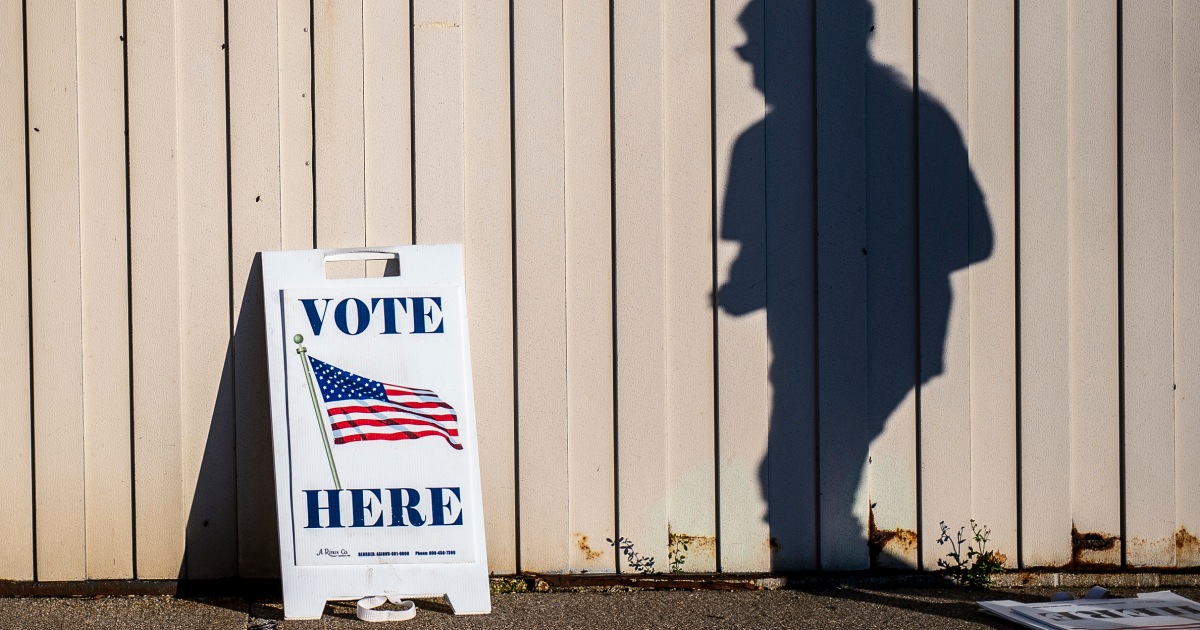A top Democratic senator is asking the Biden administration to do more to help state and local governments detect and respond to online disinformation campaigns designed to manipulate voters in the November election, according to a letter obtained by NBC News.
Sen. Mark Warner of Virginia, chair of the Senate Intelligence Committee, urged the federal government’s civilian cybersecurity agency to ramp up support to state and local election officials who he said are facing an onslaught of false information — from domestic and foreign actors — that threatens to disrupt this fall’s voting.
“Unfortunately, throughout this election cycle we have witnessed an unprecedented rise in targeted election disinformation campaigns,” Warner wrote to Jen Easterly, director of the Cybersecurity and Infrastructure Agency (CISA).
“I strongly urge you to use all the tools at your disposal to provide state and local administrators with the necessary resources to uncover, build resilience against, and rapidly respond to information manipulation campaigns leading up to the election and afterwards,” Warner wrote.

Warner’s appeal comes after repeated warnings from intelligence officials that Russia, Iran and China are waging secret information operations to try to shape the election outcome and revelations that Iranian operatives hacked into former President Donald Trump’s campaign and tried to distribute stolen information to major media outlets.
The senator’s letter coincides with growing concern among nonprofit groups and lawmakers that the federal government and social media tech firms are taking an overly passive approach to the threat of disinformation. They say some understaffed state and local election agencies are ill-equipped to handle the problem and are uncertain how much they can rely on federal agencies for help.
In his letter, Warner said state and local governments are hard-pressed to keep up with the rapid advances in AI-generated information operations. The cybersecurity teams at the state and local level operate “with limited staff and resources, making it extremely difficult for smaller teams to respond to sophisticated AI-backed campaigns targeting elections,” Warner wrote.
The lawmaker said the breadth of domestic and foreign efforts to manipulate information not only poses a threat to the stable administration of elections but also threatens to suppress turnout and intimidate voters. The senator cited recent elections plagued by false claims, including Florida in 2020, when tens of thousands of voters got emails directing them to change their party affiliation and vote for a particular candidate or face physical violence.
The senator praised CISA for providing educational materials and other information to local governments, and called on the agency to build on those efforts and expand its work with associations representing state election offices.
CISA has said previously that the agency has focused on helping educate the public and train state and local election officials about the tactics employed in disinformation campaigns.
“At CISA, we certainly have not stopped prioritizing this as a threat vector that we take very seriously for this election cycle,” a CISA official told NBC News in June.
A coalition of nonprofits and good-government groups has organized a bipartisan, national network of former officials, technology specialists and others to help local election authorities detect deepfakes or other false claims quickly and respond with accurate information.
U.S. authorities last week said they had taken a series of actions to disrupt Russian disinformation efforts, including shutting down web domains, imposing sanctions and indicting two Russians who allegedly funneled money to American influencers while concealing Moscow’s role.
But the Biden administration has no firm plans to alert the public about deepfakes or other false information in the run-up to November unless it is clearly coming from a foreign actor and poses a sufficiently grave threat, according to current and former officials. Instead, for any disinformation originating from within the U.S., it will likely be up to state and local election officials to flag it to voters.
Officials in the FBI and the Department of Homeland Security worry that if they weigh in, they will face accusations that they are trying to tilt the election in favor of Vice President Kamala Harris, current and former officials say.
Under pressure from Warner and other lawmakers, the intelligence community has declassified some material about foreign disinformation and, for the first time, the Office of the Director of National Intelligence has held regular media briefings on efforts by foreign adversaries to influence the 2024 election.

Leave a Reply